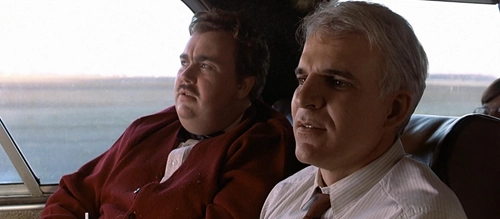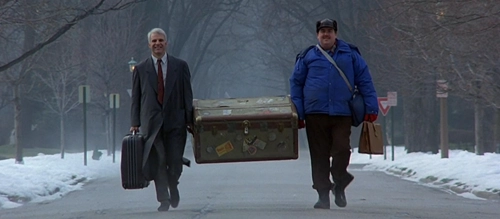Planes, Trains and Automobiles (1987) Review

Planes, Trains and Automobiles (1987)
Director: John Hughes
Screenwriter: John Hughes
Starring: Steve Martin, John Candy
You’d be hard-pressed to name a more beloved Thanksgiving movie than the late John Hughes’ Planes, Trains and Automobiles (1987). For many, the film has a virtual monopoly on the holiday’s cinematic canon (sorry, Charlie Brown) and endures as quintessential post-feast viewing. And, while Hughes’ other holiday flicks such as National Lampoon’s Christmas Vacation (1989) and Home Alone (1990) would go on to become living room mainstays in their own right, the king of crowd-pleasers’ first foray into holiday fare remains his most timeless.
The film stars Steve Martin and the late John Candy as an oddball pair of unlucky travelers determined to make it home for Thanksgiving—in spite of the gamut of transportation delays thrown their way. The two are total opposites: Martin plays Neal Page, a prickly, Scroogean advertising executive who wants nothing more than to be left alone, while Candy plays Del Griffith, a chatterbox shower-ring salesman who Neal can’t seem to shake. Needless to say, Neal and Del’s perceived incompatibility makes for some delightful screwball comedy as they continually find themselves stranded.
Anyone even marginally familiar with Steve Martin or John Candy’s work can see how inspired their casting was for a film with such a premise. These guys are their characters, and their characters are them. Their chemistry is palpable even as Neal’s standoffishness increasingly and hilariously chafes up against Del’s inability to take a hint. Hence the litany of endlessly-quoted one liners—some scripted, some improvised—which have cemented themselves in the American pop-culture lexicon (“Those aren’t pillows!”).
And yet such iconic moments were ultimately conjured by Hughes’ brisk and gratifying script, as well as his willingness to let the performers make it their own. As Kevin Bacon—who has a brief cameo at the beginning of the film as the guy Neal races to hail a cab during rush hour—once recalled, “He wasn’t precious about his own dialogue. He was precious about his characters.”
One might recall the motel scene—in which Neal ruthlessly explodes on Del, only for Del to soberly reaffirm his security with himself, with all his idiosyncrasies and eccentric tendencies—as one of many in the film that cracks you up while tugging at your heartstrings. This is where the film hits a sweet spot: one where farcical comedy is balanced seamlessly with sincere emotional drama. Martin and Candy elevate the latent sentimentality in Hughes’ script to surprisingly moving ends, and Hughes relishes in it. Perhaps more so than National Lampoon’s and Home Alone—both of which Hughes wrote, but did not direct—Planes, Trains and Automobiles’ direction seems to be in perfect harmony with its performers, mining Martin and Candy’s brilliance for all it’s worth.

Above it all, Neal and Del’s ultimate connection—one between two lonely men who, under different circumstances, would likely remain total strangers—is what maintains the film’s continued resonance. We care about these characters because, in a way, they are us. Perhaps even more so today than in 1987, the tedium of our routines so often alienates us from our neighbors. It would not be difficult to imagine a contemporaneous version of this film sending up the impersonality of ridesharing and the gig economy. (When was the last time you made meaningful conversation with your Uber driver? What if you were now stuck with them?)
Underneath all the film’s warm-and-fuzziness is a sort of universal truth, an exercise in empathy that has maintained its potency. As Hughes once said about the film: “I like taking dissimilar people, putting them together, and finding what’s common to us all.” These themes are not new, but they are universal—and when delivered skillfully and sincerely, comedy can become quite affecting. Planes, Trains, and Automobiles is one of those films that feels like a rarity in big studios’ output today and yet timeless nonetheless, which is perhaps why it is remembered so fondly. This is a comedy that set a standard for the genre—even if, at the end of the day, it was all in the holiday spirit.
Score: 19/24
Written by Connell Oberman
You can support Connell Oberman in the following places:
Twitter: @ObermanConnell
Instagram: @connello_22
Substack: ConnellOberman


I love this movie. 10 stars!